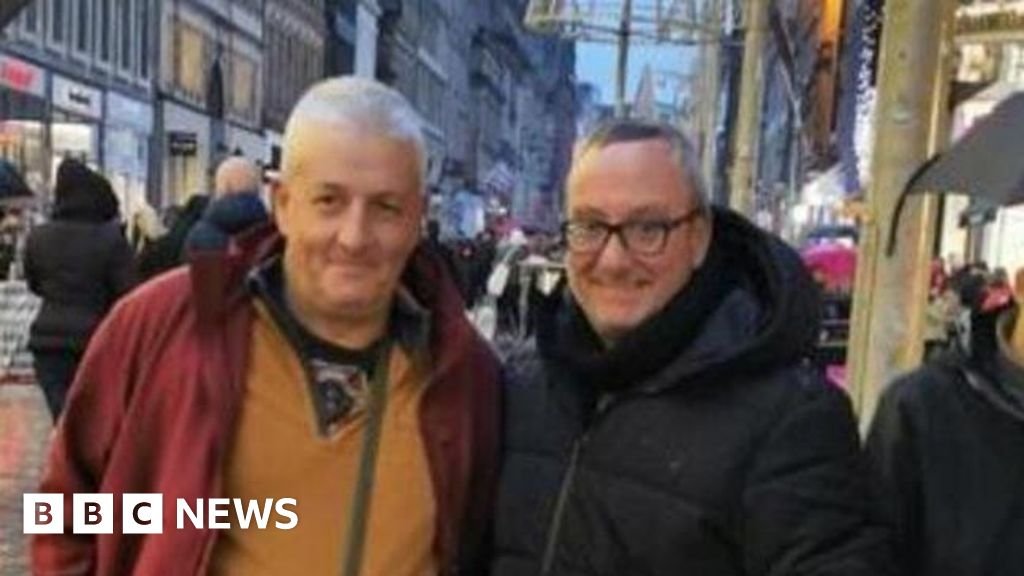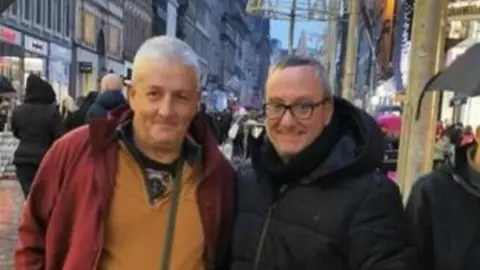 Colin Cowan
Colin CowanThe brother of a British-Israeli man killed by Hamas has accused the SNP of double standards in its stance on Israel.
Bernard Cowan, originally from Glasgow, was killed by Hamas gunmen in his home on a kibbutz in Southern Israel during the 7 October attack.
The 57-year-old left his family in Scotland when he was just 19 to move to Israel.
Then first minister Humza Yousaf was widely praised after he embraced Mr Cowan’s grieving mother during a visit to Giffnock Newton Mearns Synagogue in East Renfrewshire a few days after his death.
Mr Cowan’s brother, Colin Cowan, said he now believed Mr Yousaf had merely used the meeting with his mother as a photo opportunity and questioned how sincere he has been in his comments at the time.
He also said he had been angered by criticism of External Affairs Secretary Angus Robertson, who apologised after meeting an Israeli diplomat earlier this month.
Mr Cowan said Scottish Jews wanted First Minister John Swinney to acknowledge the “legitimate fears” of the community and to meet them.
An SNP spokesperson said the party stood “entirely against” antisemitism, and the first minister said he would be grateful for the opportunity to meet Mr Cowan and his family.
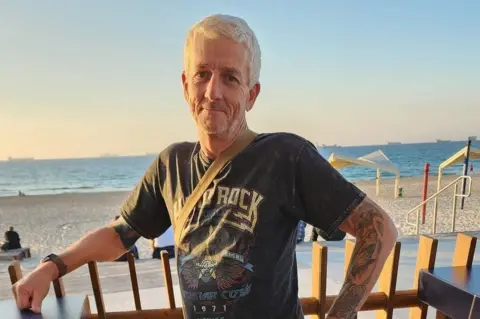
Mr Robertson was heavily criticised by several senior members of his own party – including former SNP ministers Emma Roddick, Kevin Stewart and Elena Whitham – after he met Israel’s Deputy Ambassador to the UK Daniela Grudsky on 8 August.
Mr Robertson subsequently said he was sorry that the meeting was not “strictly limited” to talks about a ceasefire.
He said the Scottish government would not accept further invitations to meet Israeli diplomats until “real progress” had been made towards peace and humanitarian assistance, and until Israel “co-operates fully with its international obligations on the investigation of genocide and war crimes”.
The SNP also withdrew the party whip from MSP John Mason over social media posts in which he questioned whether Israel was committing genocide in Gaza.
More than 40,000 Palestinians have been killed as a result of Israeli military action in Gaza since the 7 October attacks, the Hamas-run health ministry has said.
That equates to about 1.7% of the 2.3 million population of the territory, with satellite image analysis suggesting nearly 60% of buildings in Gaza have been damaged or destroyed since the beginning of the war.
Mr Cowan said he believed Israel was being “targeted” as the Scottish government had met with representatives from other countries with “terrible civil rights” such as Turkey.
“Israel is the only Jewish state in the world,” he told BBC Radio’s Good Morning Scotland. “The definition of antisemitism is prejudice against Jewish people.
“So if the Scottish government aren’t willing to talk to Israel, is that not being prejudiced against Jewish people?
“Why is it that Israel is being targeted when every other Western country is quite happy to talk to Israel? If you want a balanced, impartial view, you should meet with both sides.”
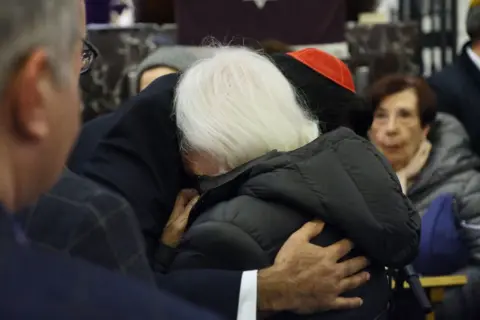 PA Media
PA MediaSpeaking at the service on 12 October at the Giffnock Newton Mearns Synogogue at which he met Mr Cowan’s mother, Mr Yousaf said he stood in solidarity with Scotland’s Jewish community.
He added: “I want you to know that this first minister, who is proudly Muslim, shares the pain of our Jewish communities.
“Your heartbreak is my heartbreak. Your loss is my loss. Your tears are my tears.”
Mr Yousaf has been a vocal critic of the Israeli military action in Gaza, which says has gone “way beyond a legitimate response” and has been “tantamount to ethnic cleansing”.
Mr Cowan said he now believed Mr Yousaf had used the service at the synogogue as a “photo opportunity” and questioned how genuine he had been.
“At the time, it seemed quite genuine,” he said.
“But some of what he said recently, it doesn’t seem so genuine anymore. It seems a bit biased, what he did at the time.”
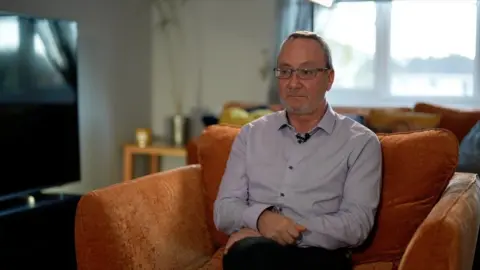
Mr Yousaf said his thoughts were with all of the families impacted by the 7 October attack, as well as families in Gaza “who have been devastated by Israel’s horrendous actions”.
He said: “When I participated in the service of solidarity at Giffnock Shul in October last year, it was at a time of extreme personal grief as my in-laws continued to be trapped in a warzone in Gaza, not knowing whether they would live or die day-by-day.
“My commitment to the Jewish community then, and now, is to be an ally in the face of antisemitism, and I am proud of my lifelong campaigning against hatred in all of its forms, and believe that Islamaphobia and antisemitism are two sides of the same coin.”
But he said that criticism of the actions of the government of Israel was not antisemitism.
“While I support diplomacy, even with countries we fundamentally disagree with, there must be limits,” he said.
“That is why I support the Scottish government ensuring there are not normal diplomatic relationships with the government of Israel until they comply with their international obligations and cease killing civilians with impunity.”
‘Never felt so unsafe’
Mr Cowan said he had noticed a spike in antisemitism since the escalation between Israel and Gaza following the 7 October attacks.
“I’ve never felt so unsafe in Scotland as I have in the last year,” he said.
“Walking down the street, would I be targeted if they knew I was Jewish? It’s definitely an unsafe feeling at the moment.
“There have been numerous incidents of buildings being attacked, people being attacked since 7 October. The Palestinian support that we see, the protests on a weekly basis, makes us feel unsafe.”
He told BBC Scotland that his relatives living in Israel had been displaced amid the ongoing violence.
“They’re not living in their home, they’re living somewhere else,” he said.
“They are distraught. They’ve lost a father, husband, grandfather, we’ve lost a brother, my mum’s lost a son. It’s hard.
“It’s not easy when someone so young is taken. We’re still reeling from it.”
An SNP spokesperson said the party stood “entirely against” antisemitism.
They said: “Following last year’s horrific attacks by Hamas, SNP policy has been consistent and clear that hostages must be released, an immediate ceasefire must be put in place and that a viable Palestine state must be recognised within a two-state solution where Israelis and Palestinians can live alongside each other in peace.”
